Get Inspired
Making it Through the Perfect Storm
Dan Devaney was a standout linebacker for the University of Oregon. He suffered multiple concussions and countless subconcussive impacts in his athletic career. After graduating in 1986, Devaney started on a decades-long fight with addiction, mental health, and suicidality. Devaney is still in his recovery journey but found light through vulnerability, therapies, and connection with others. He’s devoted his life to helping others fight the same battles. As part of CLF’s Suicide Prevention Month campaign in 2022, Devaney shared his story of overcoming suicide and living his best life with possible CTE.
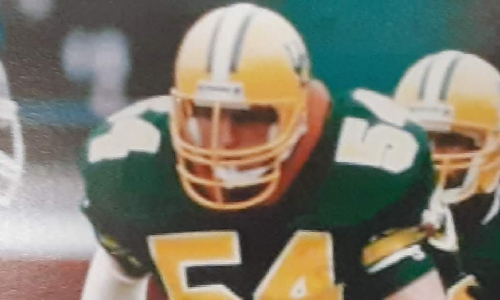
Warning: This story contains mentions of suicide and may be triggering to some readers.
By Dan Devaney
I am honored CLF asked me to share a little about myself and provide some of my sports background along with mental health, addiction, suicidality, and recovery. My biggest hope is that my story can help someone else in their journey.
I was born and raised in Portland, Oregon. I was the youngest of eight kids and grew up in a very athletic family. My older brothers excelled in just about every sport. My brothers played football and my siblings were involved in bull riding, horseback riding, track & field, and everything in-between. I was constantly learning from and competing with them.
In seventh grade, I started playing tackle football. My success in football took me to the University of Oregon, where I played linebacker from 1982 to 1986.
Football took me to great heights. I had the game-winning fourth down stop against UCLA. My senior year after we beat rival Oregon State 49-28, coach Rich Brooks presented me with the game ball.
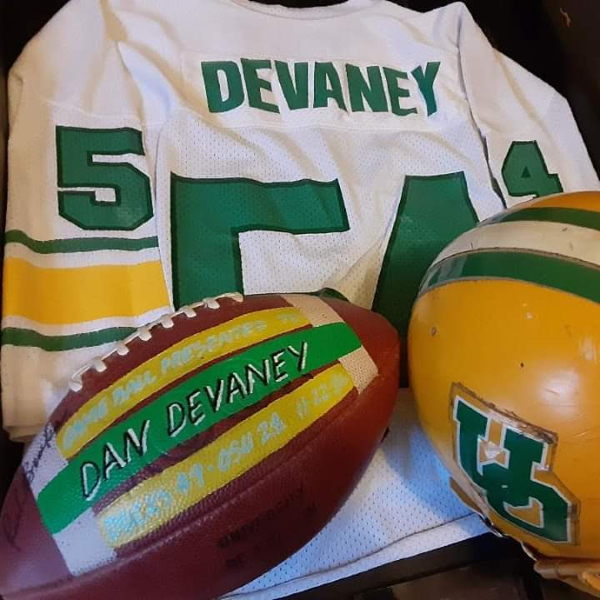
I loved putting the uniform and helmet on. It was quiet inside the helmet. No one could see me in there. I was Clark Kent before I put the uniform on and Superman when I came out.
Over the course of my decade-plus in football, I was involved in countless collisions and hundreds of what were then known as “bell-ringers.” I was an undersized linebacker and I compensated for my lack of size by weaponizing my head. There were many instances where my teammates had to help me line up in the right place after I had made a big hit.
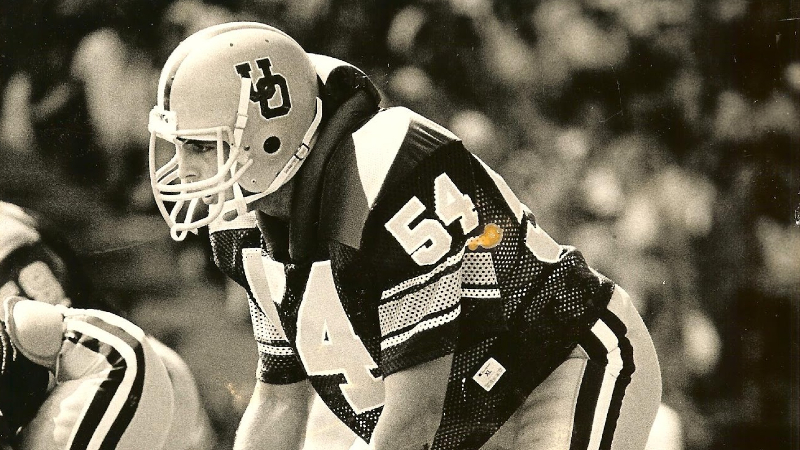
Back then, those hits were simply part of the game. But now I know those hits add up and I believe have affected my mental health. My head trauma is part of what I like to call the “perfect storm” of issues I face.
Addiction is another part of the storm. I became lost when there was no more uniform to wear and no helmet to hide in. The 30-plus years of my life after the University of Oregon are colored by alcoholism, poor decision-making, and denial. I was fired from a sales role for drinking on the job but still wasn’t ready to admit I had a problem.
I worked survival jobs for years to keep myself and my addiction alive. I spiraled for years before my life moved in a positive direction.
The last part of my perfect storm was the trauma I endured in my life. I lost both parents before I was 23 years old. I’ve been abused. I uncovered these traumas through eye movement desensitization and reprocessing (EMDR) therapy. Working backwards through trauma allowed me to move forward and get closer to sobriety.
By 2020, life was great. I was sober. I was working as a drug and alcohol counselor. But then the COVID-19 pandemic hit and turned everything upside down. Within six weeks of the pandemic, I had lost multiple friends to suicide and overdose. The pandemic halted all my personal and professional momentum.
I became deeply depressed. I relapsed. At my lowest point, I decided I didn't want to live with the mental and physical pain I was experiencing. I had no idea how to find my way out. There was only one way. I attempted suicide on May 15, 2020. Luckily, a friend happened to call me to check in shortly after the attempt. She sent an ambulance to my apartment and saved my life.
Fortunately for me, I made it past that lowest point. It wasn’t overnight, and no one thing got me out of that dark hole – rather a combination of a lot of different factors that I’ll gladly share here in the hope it helps others.
I embraced a higher power. I chose God, but your higher power can be anything that grounds you and is greater than yourself.
I continued EMDR and other therapies. Dealing with past traumas, guilt, and shame allowed me to move forward. The past is a place of reference, not a place of residence for me.
I try to go to an AA meeting every day. It was in a meeting where I finally said aloud what I had been grappling with for years: “I don’t know what’s wrong with my brain.” The culture of meetings is good for me. Even if I don’t want to go, I always leave meetings feeling like I took the medicine I needed. I always say meetings are the cheapest form of therapy you could ever have.
I got more comfortable opening up, and specifically got comfortable opening up to other men. My dad had died when I was young and my brothers had already moved out of the house and lived with their families. From early on, I took on the role of protector for my mom and sisters. My years in football only strengthened my expectation that men should be tough and not come to each other with their problems. Eventually, I learned to embrace the guys in AA meetings and in football circles who had been where I had been and would support me.
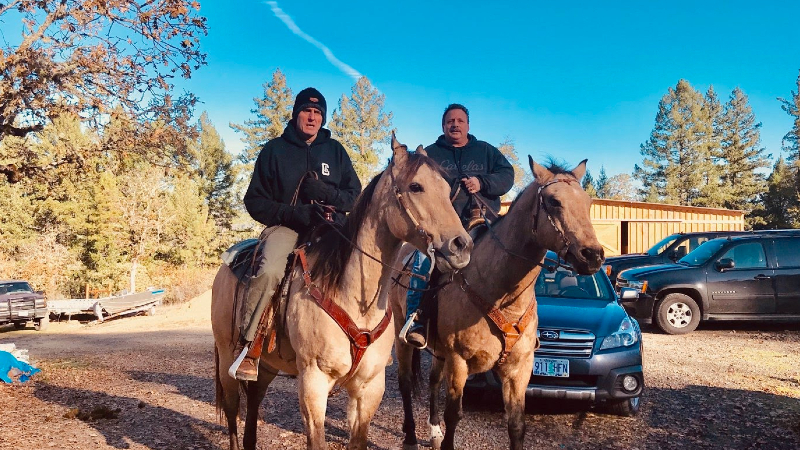
Lastly, I fully embraced the power of connection. I’ve developed a “No Matter What” club full of people who know any of the members will pick up the phone, no matter what. It took me a very long time to get to the point where I could support others but being here feels great. I keep my side of the street clean and can be of service to others.
That’s how I manage my mental health and my addiction but remember – I am in the perfect storm. I know CTE may be part of my reality. I suffer from short-term memory loss. Looking back, I can see my decision-making has been poor. I can be impulsive. I know so many of my football brothers face the same question I do about whether we are living with CTE. It’s a difficult place to be but there are things we can do to help ourselves.
First and foremost, we have to take care of our bodies. For me, that means no drinking and no drugs. It means getting good sleep and eating well.
I also find success being consistent with my lifestyle and keeping things simple. I often ask myself, “What’s good for Dan?” The answer might mean I have to disappoint others, but I know what I need to do to protect my physical and mental health.
Connection is also a key part of living in the face of CTE. Sure, so many of us wonder if we are living with the disease. But to flip that around, so many of us can connect and bond over the fact that we share the same worry. We are not alone, and we can't do this alone. Believe me, I have tried more than once to do it my way and failed miserably.
My final way to manage my perfect storm is by stepping outside my comfort zone and doing things that fill my heart. I’ve got a big novel experience, albeit in a familiar place, coming up soon. On Saturday, October 1, I will be honored by the University of Oregon in the Ducks’ home game against Stanford. I was extremely flattered by the honor but also knew the experience will also bring up several intense emotions. I’ll think of ex-teammates I’ve lost. I’ll have to go to an airport – an extremely triggering environment for many addicts. A younger me may have run from the moment, but some friends urged me to go. To help things, I’ll be going with a member of the No Matter What Club.
Connection has turned my life around. I’m happy to do what I can to connect with anyone else out there struggling. If you want to connect with me, please don’t hesitate to reach out. I’m always available at devaneydm@yahoo.com.
Suicide is preventable and help is available. If you are concerned that someone in your life may be suicidal, the five #BeThe1To steps are simple actions anyone can take to help someone in crisis. If you are struggling to cope and would like some emotional support, call the National Suicide Prevention Lifeline at 988 to connect with a trained counselor. It’s free, confidential, and available to everyone in the United States. You do not have to be suicidal to call.
Are you or someone you know struggling with lingering concussion symptoms? We support patients and families through the CLF HelpLine, providing personalized help to those struggling with the outcomes of brain injury. Submit your request today and a dedicated member of the Concussion Legacy Foundation team will be happy to assist you.
Suicide Prevention Resources

Nobody should have to go through a crisis alone. Dial 9-8-8 if you or a loved one is in crisis or suicidal.
Suicide Prevention Lifeline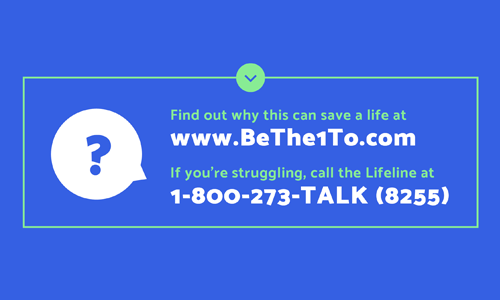
We can all play a role in preventing suicide. Learn the five steps to help you #BeThe1To support someone in crisis.
#BeThe1To Resources